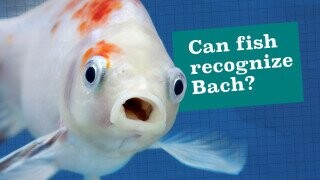5 Petty Things That Science Has Actually Made It a Point to Study

Science isn’t just about curing cancer and locating new planets. Science spans a great many fields, and its scholars study various subjects you’d never even think about for their research. These subjects, while not necessarily humanity’s top priority, all matter in their own way. And the research provides answers to truly important issues, absolutely vital questions such as…
Does Tapping a Can of Beer Reduce Froth?
When a can of beer may explode upon opening, a time-honored trick says you snap it to cut down on the froth. Or rather, the tip says to “tap” the can, but we’re going to use the word “snap” instead, since “tap” may also mean something totally different when you’re talking beer. But does snapping (or tapping) the beer actually do anything? No, concluded a 2019 study from the University of Southern Denmark.

University of Southern Denmark
From the Carlsberg cans prominently pictured above, you might guess that this study was commissioned by Carlsberg as an advertising stunt, which would explain everyone’s motivation just fine. It was not. As a result, the researchers struggled to explain why they bothered looking into this topic. Their results (which advise against snapping) might reduce “wrist and finger injuries,” they claimed, while providing no evidence that snapping causes such injuries. They also claimed that if drinkers now refrain from snapping — and therefore must wait longer for their beers to settle — they will pour out beer more economically and save money. This is the sort of logic that only makes sense after you’ve imbibed at least five beers.
For the study, health economics post-doctoral researchers obtained a thousand cans of beer and had two teams of subjects open them, some after snapping, some without snapping. The subject were all students, so we can surmise that this was all just an excuse to score booze and throw an ølfest.
Do Many Couples Have Sex When Their Team Wins the Super Bowl?
In 2016, one ad during the Super Bowl promoted the game itself. It covered the concept of “Super Bowl babies,” kids born exactly nine months after their hometown’s football team won the championship. For the campaign, the NFL tracked down various children and invited their parents to let them audition for an ad, without telling the parents till later that the ad was going to be about their specific motivations for having sex.
This raised several questions. Such as: Really, is that a good use of airtime? Couldn’t you make much more money airing ads from other companies? If your audience is currently watching the Super Bowl, do you have to promote the magic of the Super Bowl to them, rather than assuming they’re already invested? But also: Does this concept of Super Bowl babies really exist? Meaning, when a county’s NFL team wins the big game, does the birth rate spike nine months later from all the celebratory sex?
The University of North Carolina sought to answer this question through analyzing birth records. Much like the 2016 Super Bowl (Denver Broncos 24, Carolina Panthers 10), the results were anticlimactic. After spending many words on why couples might have more sex right after a big win, and laying out all the relevant data they could find, they concluded that, no, they couldn’t find any link between the two variables.
Which doesn’t exactly disprove the claim that birth rates rise after a win, they noted. Maybe the NFL, who put forward that claim, used other data or other kinds of analysis. We trust several dozen follow-up studies will investigate this matter further.
Can Fish Recognize Bach?
You’ve heard that goldfish have bad memories (which is false). And you’ve heard that goldfish are tiny animals well suited for living in a bowl (also false — they grow to more than a foot long). But what about the famous stereotype that goldfish can’t appreciate classical music? Have you ever thought to examine that preconception of yours?
Don’t worry. Scientists at Keio University in Tokyo have your back. They played several pieces for goldfish, including Bach’s “Toccata and Fugue in D Minor,” aka, that spooky music that your hunchback servant plays on the pipe organ, as well as Stravinsky’s “The Rite of Spring.”
After a series of trials that involved fish eating food pellets when alternating musical stimuli played, the researchers concluded that, no, the fish couldn’t tell Bach from Stravinsky. But fish were able to discriminate between music and silence, or at least between noise and silence (they preferred silence), which is a skill we can’t take for granted.
Interestingly, a great many sites reporting on the study did so by saying, “Yes, fish can distinguish between Bach from Stravinsky.” We suppose this is because they just assumed no one publishes a study unless it proves the thing they were searching for. Honestly, props to you scientists for publishing results when they don’t confirm your hypothesis. That’s an essential part of the scientific process. We’ll still make fun of you for finding nothing, but that doesn’t make you any less brave.
How Manly is Woodchopping Really?
Are lumberjacks as manly as we think? Do all lumberjacks wear suspenders and a bra? To find out, University of California, Santa Barbara anthropologists compared testosterone boosts from chopping wood to testosterone boosts from playing soccer. They concluded the woodchopping beats ball-kicking. It’s such a random and weird line of investigation that it crosses the line beyond stupid, to the point where it’s hard to believe the study was as dumb as headlines made it sound.
In reality, the investigators weren’t particularly concerned with woodchopping. They were interested in the Tsimané, an indigenous Bolivian group. Some people associate living off the land with high testosterone, but the Tsimané, who are forager-horticulturalists, have much lower testosterone than their American counterparts. Lots of exercise, decent muscle, but low T. One activity the Tsimané engage in regularly is woodcutting. So the scientists measured some Tsimané men’s testosterone after cutting trees and some men’s after playing soccer. Maybe they’d get more of a T boost after doing the kind of exercise men in industrialized countries do.

“Also, because this photo’s from 1913, all these people are now dead.”
Turns out, no, sports don’t help: Tsimané get a lower boost from soccer than from cutting wood. Huh. Well, maybe it’s not about activity then, maybe they just have low testosterone because they suffer from parasites.
Also, the study didn’t compare one group of men doing both activities but instead studied one group of woodcutters to one group of soccer players. Apparently, telling Tsimané how to spend their afternoon is how you get them to hate anthropologists. So, if you stumbled on this story because you were interested in how to boost your own testosterone, you’re looking in the wrong place. Luckily, you have a much easier way of boosting testosterone: Just inject the stuff right into your body. We trust this produces no side effects, but look up a few studies to be sure.
Do Parachutes Offer Any Benefit to People Who Jump Out of Planes?
Parachute safety matters, of course. If you have any doubt about that, just ask someone currently plummeting to the ground (you’ll have to ask them rather quickly). Here’s a broad question on the subject, though: Do parachutes offer any benefit at all? No, concluded a British Medical Journal study. You will survive your descent regardless.
Researchers from Harvard, UCLA and the University of Michigan randomly assigned study participants into two groups. Half received a parachute, while half did not. All of them jumped out of a plane. All of them survived the fall, and even after a follow-up 30 days later, the scientists detected no difference in health between the two groups. This suggests that parachutes confer no measurable benefit.
The authors did note some shortcomings in the study, however. The plane they used sat stationary on the ground during the experiment. It was also a very small plane. This photo shows the jump, depicting the level of danger involved:

Surprise, they lied about the study’s goal. The actual purpose of the study was to demonstrate how randomized controlled trials sometimes uncover nothing, even if “a cursory reading of the abstract” makes them sound revolutionary. We can make fun of science studies all we want, but no one makes fun of them better than scientists themselves.
Follow Ryan Menezes on Twitter for more stuff no one should see.